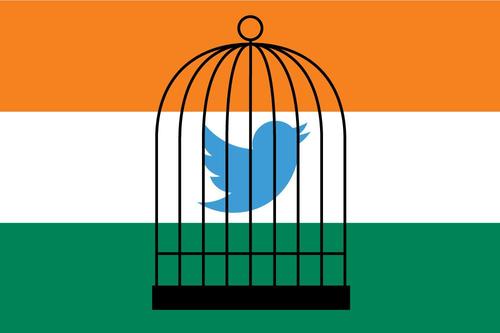Twitter Admits To Censoring Criticism Of The Indian Government
On Saturday, Twitter admitted that it is actively working with the Indian government to censor criticism of its handling of the pandemic as the number of cases and deaths continues to skyrocket.
There are widespread reports that the Indian government has misrepresented the number of deaths and the true rate of cases could be as much as 30 times higher than reported. The country has a shortage of beds, oxygen, and other essentials due to a failure to adequately prepare for a new surge. Not surprisingly, the Indian government has moved to crackdown on criticism. This included a call to Twitter to censor such information and Twitter has, of course, complied.
With the support of many Democratic leaders in the United States, Twitter now regularly censors viewpoints in the United States and India had no trouble in enlisting it to crackdown on those raising the alarm over false government reporting.
Buried in an Associated Press story on the raging pandemic and failures of the Indian government are these two lines:
“On Saturday, Twitter complied with the government’s request and prevented people in India from viewing more than 50 tweets that appeared to criticize the administration’s handling of the pandemic. The targeted posts include tweets from opposition ministers critical of Modi, journalists and ordinary Indians.”
The article quotes Twitter as saying that it had powers to “withhold access to the content in India only” if the company determined the content to be “illegal in a particular jurisdiction.” Thus, criticism of the government in this context is illegal so Twitter has agreed to become an arm of the government in censoring information.
Keep in mind that this information could protect lives. It is not “fake news” but efforts by journalists and others to disclose failures by the government that could cost hundreds of thousands of lives.
This is the face of the new censors. The future in speech control is not in the classic state media model but the alliance of states with corporate giants like Twitter. Twitter now actively engages in what Democratic leaders approvingly call “robust content modification” to control viewpoints and political dissent.
When Twitter’s CEO Jack Dorsey came before the Senate to apologize for blocking the Hunter Biden story before the election as a mistake, senators pressed him and other Big Tech executive for more censorship.
In that hearing, members like Sen. Mazie Hirono (D., HI) pressed witnesses like Mark Zuckerberg and Jack Dorsey for assurance that Trump would remain barred from speaking on their platforms: “What are both of you prepared to do regarding Donald Trump’s use of your platforms after he stops being president, will be still be deemed newsworthy and will he still be able to use your platforms to spread misinformation?”
Rather than addressing the dangers of such censoring of news accounts, Senator Chris Coons pressed Dorsey to expand the categories of censored material to prevent people from sharing any views that he considers “climate denialism.” Likewise, Senator Richard Blumenthal seemed to take the opposite meaning from Twitter, admitting that it was wrong to censor the Biden story. Blumenthal said that he was “concerned that both of your companies are, in fact, backsliding or retrenching, that you are failing to take action against dangerous disinformation.” Accordingly, he demanded an answer to this question:
“Will you commit to the same kind of robust content modification playbook in this coming election, including fact checking, labeling, reducing the spread of misinformation, and other steps, even for politicians in the runoff elections ahead?”
“Robust content modification” has a certain appeal, like a type of software upgrade. It is not content modification. It is censorship. If our representatives are going to crackdown on free speech, they should admit to being advocates for censorship.
What is fascinating is how social media companies have privatized censorship. These companies now carry out directives to censor material deemed unlawful or fake or misleading by those in power. The company also shows no compulsion to protect free speech. When India calls for censorship, it just shrugs and say that the dissenting views are now illegal.
In the meantime, liberals now support crackdowns on free speech and corporate power over viewpoint expression.
We have have been discussing how writers, editors, commentators, and academics have embraced rising calls for censorship and speech controls, including President-elect Joe Biden and his key advisers. Even journalists are leading attacks on free speech and the free press. This includes academics rejecting the very concept of objectivity in journalism in favor of open advocacy. Columbia Journalism Dean and New Yorker writer Steve Coll has denounced how the First Amendment right to freedom of speech was being “weaponized” to protect disinformation.
Liberals now embrace censorship and even declared that “China was right” on Internet controls. Many Democrats have fallen back on the false narrative that the First Amendment does not regulate private companies so this is not an attack on free speech. Free speech is a human right that is not solely based or exclusively defined by the First Amendment. Censorship by Internet companies is a “Little Brother” threat long discussed by free speech advocates. Some may willingly embrace corporate speech controls but it is still a denial of free speech.
This is why I recently described myself as an Internet Originalist. Twitter is now unabashedly and unapologetically a corporate censor. The question is whether the public will remain silent or, as some, actually embrace the new Orwellian order of “robust content modification.”
https://ift.tt/3dLFTCN
from ZeroHedge News https://ift.tt/3dLFTCN
via IFTTT





0 comments
Post a Comment